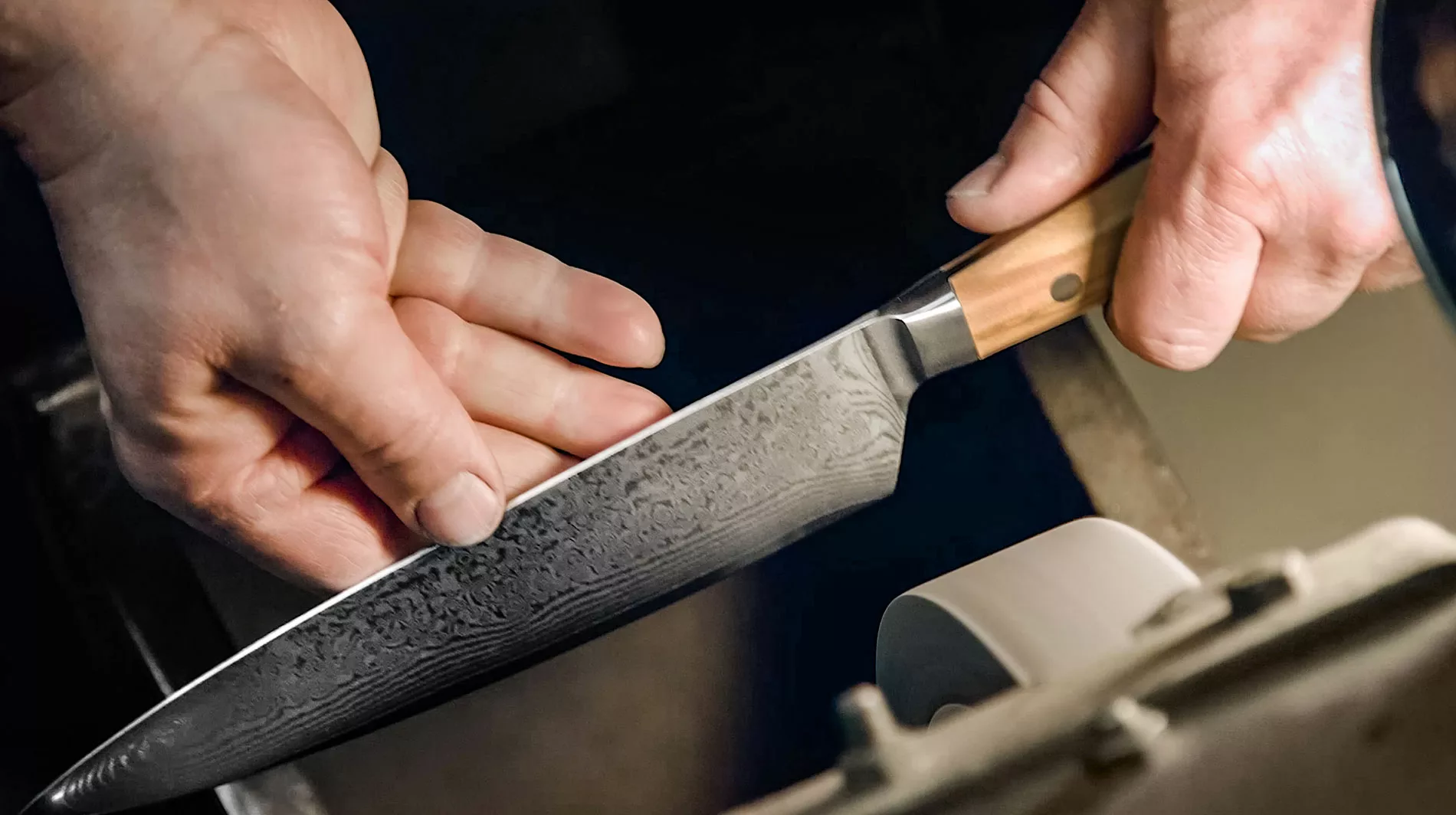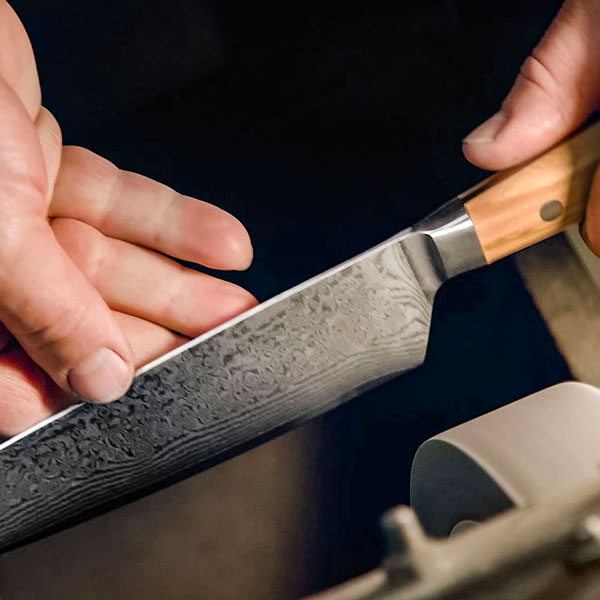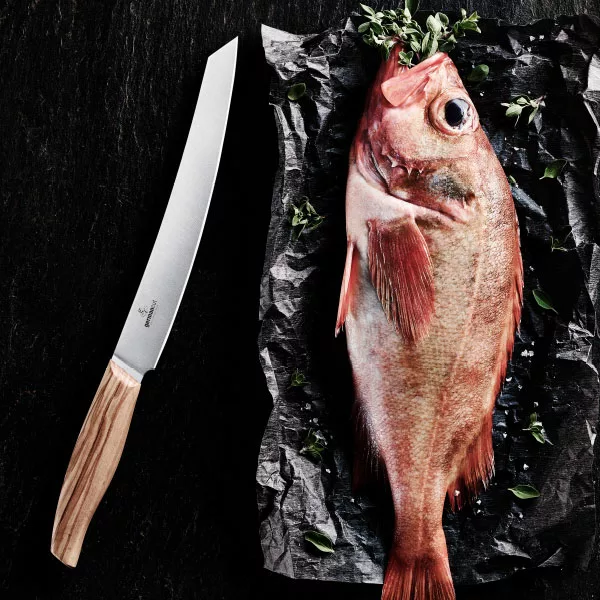

New year – new chef’s knives?
Anyone who wants to buy a high quality chef’s knife often faces the question of which one to choose.
Since a first-class specimen is sometimes very valuable and often represents an investment for the next decades, many people hesitate and shy away from a decision for a chef’s knife. In the ambiguous sense they are afraid to cut their own flesh with the purchase of a chef’s knife.
But that is not necessary. The knife purchase should not be hurried either. Pay attention to the following points when buying your future chef’s knife and nothing can go wrong.
The right Knife
The primary decision when buying a cook’s knife is to choose the type of knife you want to use.
Which professional chef’s knife or kitchen knife is the right one?
For this you have to ask yourself what you are going to do with the knife.
Do you want to cut certain foods with it or use special preparation methods?
Chef’s knives and kitchen knives must be perfectly adapted to their intended use. The function determines the shape – depending on how you work or what you want to process, the shape of the knife and the blade also changes.
If you want to cut hard bread crusts or firm peelings like those of a pineapple or pumpkin, experts recommend a bread knife. The serrated edge of this blade, which is slightly reminiscent of a saw, prevents it from slipping when cutting and makes it possible to cut through even the hardest materials.
If you intend to use the knife more for peeling fruit and vegetables, cooks recommend using an office knife rather than a chef’s knife. The peeling knife with its short blade is ideal for this kind of work.
If, on the other hand, you want an excellent and versatile Profi chef’s knife for processing vegetables, meat and fish, we can only recommend the ChefsTalk Knife – we have developed it together with ChefsTalk, the international online network for chefs and gourmets.
It thus meets the requirements of a modern chef’s knife and the needs of professional chefs worldwide.
The material of the blade
There are controversial discussions in the professional world about the right knife steel.
But one thing is clear, it has to be steel. Even though some ceramic knives are harder, they have the disadvantage that they break very quickly. They are much more prone to breakage and lever movements should generally be avoided.
Steel is produced in steelworks from iron ore. The different types of steel are a result of the different methods of production, the percentage of alloying elements and the degree of corrosion resistance.
However, one of the best known and most popular steels for chef’s knives is damask (Damascus steel). Damascus is one of the noblest steels – beautiful to look at, particularly hard and of course almost unbreakable. This is why damascus (which is a composite of different types of steel) is so highly valued in chef’s knives.
Our ChefsTalk Knives are equipped with a blade made of 65 layers of damascus steel.
The special blade grain, known as Wild Damascus, ensures maximum flexibility. The cutting edge of the chef’s knife is ice-hardened (VG 10, approx. 59 – 61 HRC Rockwell). Genuine high performance steel, which is especially characterized by its hardness, cutting durability and corrosion
The material of the handle of chef’s knives
But the handle is also crucial for the functionality of your knife.
The integral knife is widely used in Germany, where the entire knife is forged from a single piece of steel. The material of the handle encases the steel and provides a comfortable grip and hold when cutting.
In the past, many knife handles were made of bone, horns, antlers or even ivory, some of which are now prohibited, although some knife manufacturers still swear by handles made of deer antlers. Wood is as popular today as it was then and is more animal-friendly. Also aluminum or plastics are now used for the production of knife handles.
The sharpness and quality
The sharpness is often also a sign of quality. The narrower the blade, the sharper the knife, because all the pressure is concentrated on the cutting edge.
Knives of inferior quality dull very quickly and cannot be resharpened very well. A high quality knife does not mind daily sharpening, on the contrary first class chef’s knives should be sharpened regularly so they do not lose any of their sharpness.
(Read more in our previous blog post).
With our ChefsTalk Knife, the combination of the two special steels described above, as well as the extremely careful production process, results in optimal cutting performance. The extremely sharp cutting edge glides effortlessly through all foods to be processed.
The Safety
With a high-quality and sharp chef’s knife or kitchen knife, you also invest in your safety.
Through a sharp knife, fewer accidents happen, because only a small pressure must be exerted on the blade, they also slip less often.
The choice of the right knife is also important here. As explained earlier, the risk of injury to a hard crust or skins is lower with a bread knife. A short blade minimizes the risk of injury when peeling because the blade is more maneuverable. So the right chef’s knife or kitchen knife, for the job that suits it, not only ensures optimal and beautifully shaped results, but also reduces the risk of injury.
(Learn more on our blog)
The storage of the knives
When buying a knife, you should also think directly about its storage.
Unprotected in a cutlery drawer, the chef’s knife wears out quickly and also the risk of injury is increased.
Germancut therefore offers you when you buy matching your chef’s knife a leather sheath in which you can safely store your new knife. This is not only practical, but also an absolute eye-catcher.
An alternative to a knife sheath is the knife block. Knife blocks are very decorative and fit perfectly into the interior of your kitchen. In addition, they make the kitchen knives and chef’s knives look even higher quality and offer space for other accessories such as a sharpening steel, santoku or a bread knife in addition to the chef’s knife. In addition, a knife block you have your chef’s knives and accessories always at hand.
Germancut – The Online Chef’s Knife Shop: Offers, delivery and shipping
Our knives are not only great for personal use, but also make a very special gift for very special occasions. With a high-quality chef’s knife, you can make both amateur and professional chefs shine.
And also our cutlery sets
T. Fontane
J. S. Bach
T. Storm
H. Heine
F. Schiller
and W. Busch
are real eye-catchers, and not just for festive and Sunday dinners.
